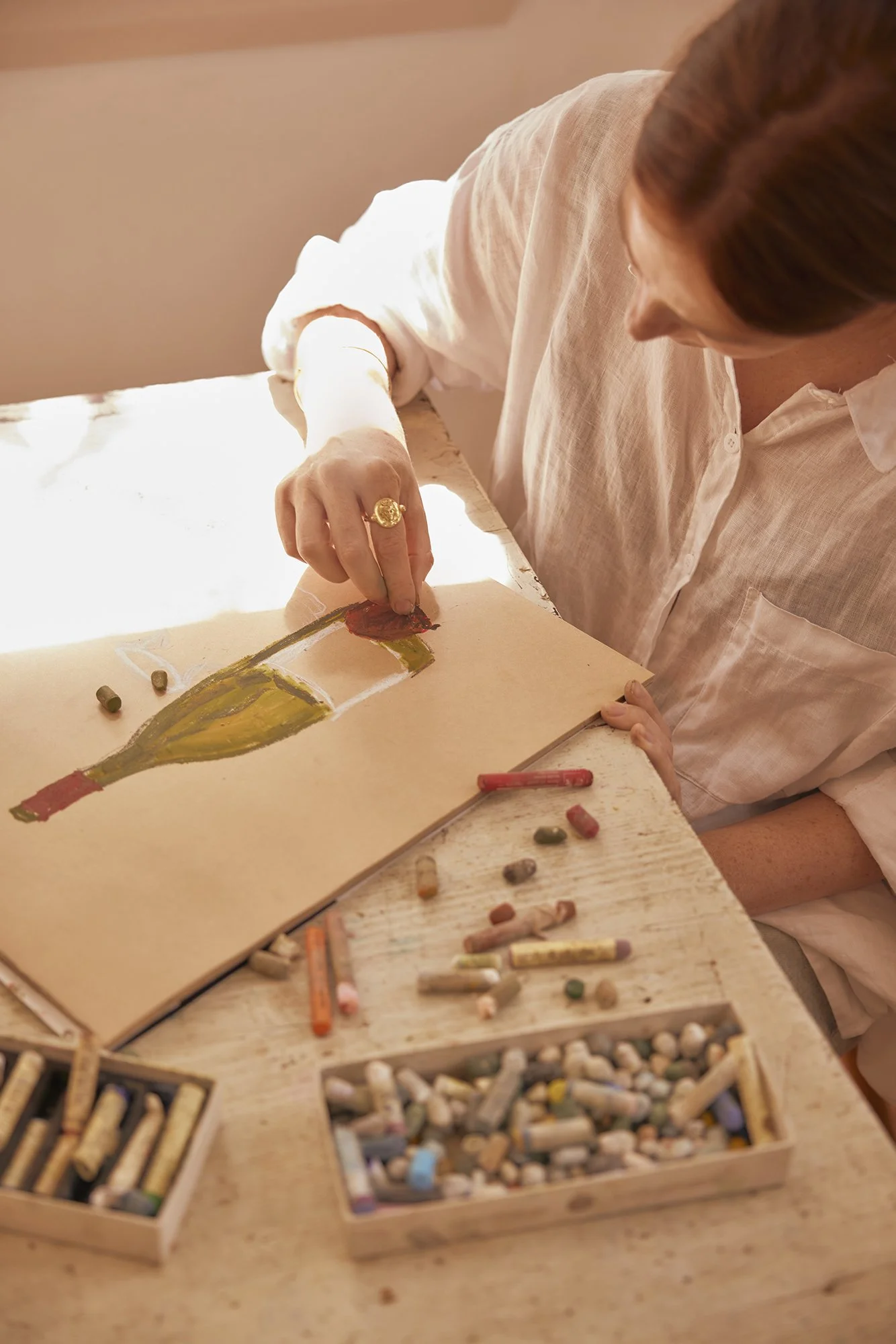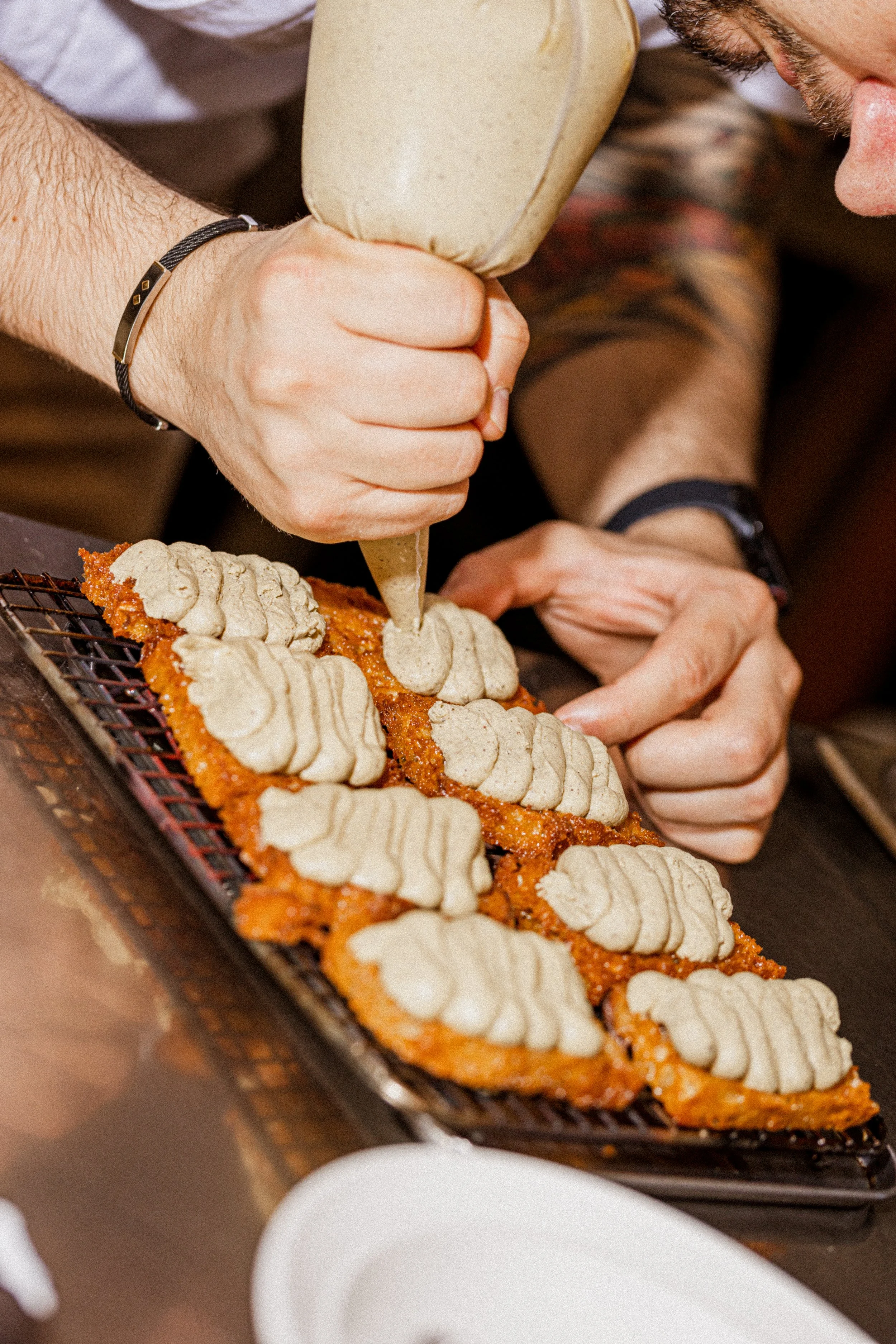Busta X Phoebe Stone
As autumn swiftly approaches, it's hard not to notice how quickly time passes. The warm, sun drenched afternoons spent with friends during summer have ended, giving way to the crisp chill of fresh autumn air. As the seasons change, many of us find ourselves swapping bittersweet Spritzes for warm wine. If you're anything like us, the prospect of hearty, comforting meals is a saving grace during the colder months. There's a certain joy that comes with spending nights in the kitchen, despite the pesky splashes of red wine that can stain tablecloths. But even those stains can serve as a reminder of the cozy moments spent wrapped in wool, savoring bread dipped in rich soups and sauces as butter slowly drips down.
There's a natural connection between food and art, as both have the power to evoke emotions and memories. In fact, they can even become intertwined and indistinguishable from each other. In this week's journal, we're featuring a heartfelt memoir from two masters on the subject: HAKE artist, Phoebe Stone and the culinary experts at Busta in Manly. Through their perspectives, we'll explore the intersection of food and art and the memories they create.
Words by Venn Miles, HAKE
Q: Why do you think that both art and cuisine share the ability to evoke such strong emotions and memories?
Phoebe Stone; Cuisine and art are both so sensory. I think that anything that connects with the senses in such strong ways will connect with us deeply. These experiences have a way of imprinting on us and embedding an emotional reaction deep within us that can resurface any time we experience that cuisine or art again.
Chef Lucas Bach; I think what these things have in common is that they offer the artist or chef a creative outlet. For me, creating dishes, I am inspired by my life experiences and I like to think that this is portrayed on the plate, in turn provoking shared memories with guests. I spend a lot of time observing guests and their reactions to our dishes. It brings me a lot of joy to see people appreciating my work and seeing how they react emotionally.
Q: Are there any particular foods that can elicit a sense of nostalgia or fond memories for you? What are they and what are your stories behind them?
Phoebe Stone; Oh there are so many. A simple hot chip makes me think of days sitting with my family on palm beach, perhaps planning a roll down the sand hill. A very happy memory. Eating gnocchi always makes me think so fondly of my 30th birthday in Tuscany. All I wanted that day was to prepare a beautiful birthday meal for me and my husband. We went shopping, I did my best with very terrible Italian to order all the ingredients. Then we went back to our little cottage amongst the ripe fig trees and I made fresh gnocchi, served antipasto, enjoyed the limoncello made by our host and a lot of good Italian red wine. It was simple, but it was heaven. I’ve drawn from This day so many times in my art practice.
Chef Lucas Bach; Usually it is just simple Italian foods that take me back to my childhood. Cheese, brown butter or a really good tomato sauce, but a big one is the smell of the yeast activating when someone is making a dough. This takes me straight back to my mum cooking bread, it's so warm and comforting.
Q: Presentation is obviously so important in both cuisine and art. What are the key things you look for when creating a composition of food?
Phoebe Stone; Balance. Colour, texture, tone, form. The right amount of complimentary elements and a certain amount of discord to keep it interesting.
Chef Lucas Bach; A big one is texture. Different ingredients or methods of cooking can bring out certain flavours and different levels of acidity, sweetness, bitterness etc. When I compose dishes I like to be minimalistic, for me, I like simple dishes with not many ingredients. Of course it's important to always consider how 'clean' a dish looks. The coordination and choice of colours make a big difference. The way a dish appears can impact the experience of eating it in a big way.
Q: Why do you think wine has been such an historically significant subject for both artist and culinarian?
Phoebe Stone; Artists like drinking it. Haha. Historically, I believe it was used as a symbol of wealth, class, taste. I think a lot of historical patrons of the arts probably wanted it in their commissioned pieces for that reason. I also think it has always just been a part of life, bottles are bound to be around and I think the form of a wine bottle is beautiful. Soft, fluid, varying opacity. They are very elegant. I’m very drawn to wine bottles for this reason. For me it’s also the emotions and memories they can evoke. A beautiful evening spent with friends over a bottle of wine (or two) where the music is just right and the conversation flows effortlessly late into the night or perhaps just a glass with a book. Those sorts of evenings always make me stop and think that life is good.
Chef Lucas Bach; For me, and I think many other chefs, wine has been such a significant part of my evolution of cooking and my love for food. Just like food, it evokes certain memories or feelings and the right or wrong wine pairing can make or break a dining experience. I think the thing that ties wine into cooking and artistry is it's cultural significance. It's historical presence in every day life is evident and it can really create a sense of occasion.
Q: In three words how would you describe the sensations you want your audience to feel when they experience your work?
Phoebe Stone; Nostalgia, connection, intimacy
Chef Lucas Bach; Joy, appreciation, satisfaction.









